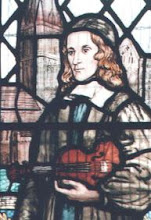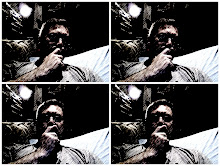Thursday, February 28, 2008
Henry James - Anniversary of death Feb. 28, 1916

On Reading Henry James: Collected Travel Writings:
The Continent: A Little Tour in Frace / Italian Hours / Other Travels. Ed. Richard Howard. (Library of America)
Henry James' travel writings on France and Italy are a case study in fine arts perception, understanding and interpretation. He treats each new locale as a new horizon to be engaged, absorbed, and internalized through a hermeneutic of analogical interiority. Roaming within the halls and chambers of French and Italian architecture opens, through the text, new conduits for an understanding of the vast interiority that exists within the self-examining-self. James is a master at relating the space of each location with the thoughts, instincts, relational perceptions and education of the observer.
Reading these texts is like engaging each site oneself and discussing with a learned and trusted friend about what one is experiencing, not just what one is seeing. The art work of Joseph Pennell is an amazing addition to these works and masterpieces on their own. Do yourself a favor and buy this book. It will be a cherished addition to your collection and a book you will pick-up time and again to walk with the "Master" through France and Italy as you discuss, reflect and remember literary events that where home to these marvels. If you happen to be planning a trip to either France or Italy, take this along to add a level of historical and cultural depth to your experience. Some of what you will read has disappeared into history, but what remains is a beautiful historical and cultural continuity with Henry James as your guide.
Some Exteriors Noted by Henry James in France:






Sunday, February 24, 2008
Promethean Pain

Prometheus Unbound, by Percy Bysshe Shelley
Prometheus' opening monologue.
Ah me! alas, pain, pain ever, for ever!
No change, no pause, no hope! Yet I endure.
I ask the Earth, have not the mountains felt?
I ask yon Heaven, the all-beholding Sun,
Has it not seen? The Sea, in storm or calm,
Heaven's ever-changing Shadow, spread below,
Have its deaf waves not heard my agony?
Ah me! alas, pain, pain ever, for ever!
 Prometheus' liver about to be eaten by a vulture brought by Hermes (Mercury) by Zeus (Jupiter) - a cruel cycle that, according to Hesiod, is repeated daily after his liver has regenerated. Art by Gustave Moreau.
Prometheus' liver about to be eaten by a vulture brought by Hermes (Mercury) by Zeus (Jupiter) - a cruel cycle that, according to Hesiod, is repeated daily after his liver has regenerated. Art by Gustave Moreau.
Comforter, where, where is your comforting?

No worst, there is none. Pitched past pitch of grief,
More pangs will, schooled at forepangs, wilder wring.
Comforter, where, where is your comforting?
Mary, mother of us, where is your relief?
My cries heave, herds-long; huddle in a main, a chief
Woe, world-sorrow; on an age-old anvil wince and sing --
Then lull, then leave off. Fury had shrieked 'No ling-
ering! Let me be fell: force I must be brief'.
O the mind, mind has mountains; cliffs of fall
Frightful, sheer, no-man-fathomed. Hold them cheap
May who ne'er hung there. Nor does long our small
Durances deal with that steep or deep. Here! creep,
Wretch, under a comfort serves in a whirlwind: all
Life death does end and each day dies with sleep.
Gerard Manley Hopkins, S.J.
Saturday, February 23, 2008
Li Qingzhao (Yi’an Jushi)
Sheng Sheng Man
To search, searching.
To seek, seeking.
Cold, clear, sorrow, pain.
Cold, clear sorrow, pain.
Hot flashes – sudden chills.
Stabbing pain – slow agonies.
No serenity can I find. I drink
Two cups, then three bowls, of tasteless wine,
Until I can’t stand against fierce wind.
Wild geese fly overhead. They break my heart,
These friends of mine from olden days.
Gold chrysanthemums spread
Across the ground, piled, faded, dead.
I could not bear to pick them this season.
In stillness, alone at my window,
I watch the gathering shadows.
Gentle rain sprinkles through the wu-t’ung trees
And drips, drop by drop through the dusk.
What can I ever do now?
How can I drive away this word
– Hopelessness?
Trans. by M. Dale
Li Quingzhao (1084-1151?), called herself Yian Jushi, from Jiana, Shandong. She is considered China’s greatest woman poet. Her father Li Gefei was a high official as well as a man of letters. Her husband, Zhao Mingcheng, was a governor of Huzhou, Zheijang , author of Jinshi Lu (Epigraphic Records) in 30 volumes. With their aristocratic background, her family nevertheless prided themselves on a life of simplicity, with a focus on things literary and contemplative. This life, however, was interrupted by the invasion of the Jin (Golden Tartars) in 1127. Her family was forced to abandon their home and valuable collection of books, seals, bronzes, manuscripts, calligraphy and paintings. In 1129, when Li was forty-six, her husband in rout to his new official post became ill and died before Li could come to him. The remainder of her life was spent in flight (saving as much of her family collections as possible) from the Jin as they forced the Song out of North China.
“Slow Measured Sound” – In this poem, Li gives voice to her passionate grief over the loss of her husband. One of the best loved Ci-poems of the Song Dynasty. The recurrence of certain sounds/words in the beginning lines was considered the poet’s unique creation. It was thought that wild geese can carry messages.

"A Serious Way of Wondering" by Reynolds Price
 For years Reynolds Price has been developing a large collection of significant works addressing areas of faith, understanding, interpretation of the Bible, morality in the modern world, and struggles with being a person of faith who has less faith in the traditional institutions that support Christian faith. It would stand to reason that one of the reasons that Price and others have been struggling with faith and understanding outside the traditional church is that there is a forgetfulness of the person of Jesus and his actions beneath platitudes and cliques. The "What Would Jesus Do?" fad, or WWJD fad, ends up to be a shallow exercise if there has not been clearheaded thought and reflection on what he did do in his times and finding modern analogies to those actions. (It also losses focus because the real question is what will we do.) To think that Jesus would never have placed himself in a position to be "tempted" by drugs or the advances of a homosexual displays a forgetfulness that Jesus was open to all who came to him without a morality filter to cut off people that were taboo. It is also naive to think that Israel in the time of Jesus was homosexual free or drug free. Alcohol is a drug and if I'm not mistaken, Jesus made more wine when the guests at a wedding drank their hosts wine too fast. Instead of a sobriety speech, he made MORE wine. Homosexuals are a percentage of every society no matter how backward their morality. So I think it is safe to assume that Jesus did come into contact with homosexuals and that they may possibly have made an advance. Remember Jesus was all about intimacy (what Ivan Klima call the Ultimate Intimacy) and this could have been mistaken for something else. We don't know, but we can find certain analogies in his dealing with others in society who were looked down upon or cast out. As Price tells us, he broke down the barriers (which were built of falsity) and touched people were they stood - open, embracing, defenseless.
For years Reynolds Price has been developing a large collection of significant works addressing areas of faith, understanding, interpretation of the Bible, morality in the modern world, and struggles with being a person of faith who has less faith in the traditional institutions that support Christian faith. It would stand to reason that one of the reasons that Price and others have been struggling with faith and understanding outside the traditional church is that there is a forgetfulness of the person of Jesus and his actions beneath platitudes and cliques. The "What Would Jesus Do?" fad, or WWJD fad, ends up to be a shallow exercise if there has not been clearheaded thought and reflection on what he did do in his times and finding modern analogies to those actions. (It also losses focus because the real question is what will we do.) To think that Jesus would never have placed himself in a position to be "tempted" by drugs or the advances of a homosexual displays a forgetfulness that Jesus was open to all who came to him without a morality filter to cut off people that were taboo. It is also naive to think that Israel in the time of Jesus was homosexual free or drug free. Alcohol is a drug and if I'm not mistaken, Jesus made more wine when the guests at a wedding drank their hosts wine too fast. Instead of a sobriety speech, he made MORE wine. Homosexuals are a percentage of every society no matter how backward their morality. So I think it is safe to assume that Jesus did come into contact with homosexuals and that they may possibly have made an advance. Remember Jesus was all about intimacy (what Ivan Klima call the Ultimate Intimacy) and this could have been mistaken for something else. We don't know, but we can find certain analogies in his dealing with others in society who were looked down upon or cast out. As Price tells us, he broke down the barriers (which were built of falsity) and touched people were they stood - open, embracing, defenseless. A Serious Way of Wondering shows us why we need writers like Price to bring us back to the reality of Jesus in History with real people doing real things. The beauty of his reflections on the suicide is ample proof that Price is neither writing for the pouch line, nor writing to take people to task for their pain and hurt (ala most evangelicals and even Dante). We on the outside are there because we want to fully engage the texts and the truth of biblical Christianity without buying into a set of presumptions that have nothing to do with the text of Bible or with Jesus' life. Price opens the door to serious wondering / reflection because we really can't be too sure what Jesus would do in all circumstances. In his day, many people thought they knew exactly what the Messiah was going to do and as we now see clearly, they were a bit presumptive. With Price, I hope for a little more wonder and little less rigidity. If this way of wondering seriously means that one is an outlaw Christian, then sign me up.
A Serious Way of Wondering shows us why we need writers like Price to bring us back to the reality of Jesus in History with real people doing real things. The beauty of his reflections on the suicide is ample proof that Price is neither writing for the pouch line, nor writing to take people to task for their pain and hurt (ala most evangelicals and even Dante). We on the outside are there because we want to fully engage the texts and the truth of biblical Christianity without buying into a set of presumptions that have nothing to do with the text of Bible or with Jesus' life. Price opens the door to serious wondering / reflection because we really can't be too sure what Jesus would do in all circumstances. In his day, many people thought they knew exactly what the Messiah was going to do and as we now see clearly, they were a bit presumptive. With Price, I hope for a little more wonder and little less rigidity. If this way of wondering seriously means that one is an outlaw Christian, then sign me up.I highly recommend Reynolds Price's A Serious Way of Wondering to all readers. If possible see also Palpable God, Three Gospels, and his Collected Poems. Anyone interested in writing should have his Learning a Trade: A Craftsman's Notebook, 1955-1997 - it is a rare glimpse of the artist at work in his studio - words.

Saturday, February 16, 2008
George Herbert's "Lent" and Bruegel's "Fight between Carnival and Lent"
 "Lent"
"Lent"WElcome deare feast of Lent: who loves not thee,"Fight Between Carnival and Lent"
He loves not Temperance, or Authoritie,
But is compos'd of passion.
The Scriptures bid us fast; the Church sayes, now:
Give to thy Mother, what thou wouldst allow
To ev'ry Corporation.
The humble soul compos'd of love and fear
Begins at home, and layes the burden there,
When doctrines disagree.
He sayes, in things which use hath justly got,
I am a scandall to the Church, and not
The Church is so to me.
True Christians should be glad of an occasion
To use their temperance, seeking no evasion,
When good is seasonable;
Unlesse Authoritie, which should increase
The obligation in us, make it lesse,
And Power it self disable.
Besides the cleannesse of sweet abstinence,
Quick thoughts and motions at a small expense,
A face not fearing light:
Whereas in fulnesse there are sluttish fumes,
Sowre exhalations, and dishonest rheumes,
Revenging the delight.
Then those same pendant profits, which the spring
And Easter intimate, enlarge the thing,
And goodnesse of the deed.
Neither ought other mens abuse of Lent
Spoil the good use; lest by that argument
We forfeit all our Creed.
It 's true, we cannot reach Christ's fortieth day;
Yet to go part of that religious way,
Is better than to rest:
We cannot reach our Savior's purity;
Yet are bid, Be holy ev'n as he.
In both let 's do our best.
Who goeth in the way which Christ hath gone,
Is much more sure to meet with him, than one
That travelleth by-ways:
Perhaps my God, though he be far before,
May turn, and take me by the hand, and more
May strengthen my decays.
Yet Lord instruct us to improve our fast
By starving sin and taking such repast
As may our faults control:
That ev'ry man may revel at his door,
Not in his parlor; banqueting the poor,
And among those his soul.
George Herbert, The Temple
 Pieter Bruegel the Elder, 1559.
Pieter Bruegel the Elder, 1559."tortur'd betwixt this world and grace" - George Herbert
 "Affliction IV"
"Affliction IV"BRoken in pieces all asunder,
Lord, hunt me not,
A thing forgot,
Once a poore creature, now a wonder,
A wonder tortur’d in the space
Betwixt this world and that of grace.
My thoughts are all a case of knives,
Wounding my heart
With scatter’d smart,
As watring pots give flowers their lives.
Nothing their furie can controll,
While they do wound and prick my soul.
All my attendants are at strife,
Quitting their place
Unto my face:
Nothing performs the task of life:
The elements are let loose to fight,
And while I live, trie out their right.
Oh help, my God! let not their plot
Kill them and me,
And also thee,
Who art my life: dissolve the knot,
As the sunne scatters by his light
All the rebellions of the night.
Then shall those powers, which work for grief,
Enter thy pay,
And day by day
Labour thy praise, and my relief;
With care and courage building me,
Till I reach heav’n, and much more, thee.
George Herbert, The Temple

Sunday, February 10, 2008
Prayer & Lamentation: Jane Kenyon
 "Now Where?"
"Now Where?"It wakes when I wake, walks
when I walk, turns back when I
turn back, beating me to the door.
It spoils my food and steals
my sleep, and mocks me, saying,
"Where is your God now?"
And so, like a widow, I lie down
after supper. If I lie down
or sit up it's all the same:
the days and nights bear me along.
To strangers I must seem
alive. Spring comes, summer;
cool, clear weather; heat, rain...
Jane Kenyon, Collected Poems

Milton - 400th Anniversary II

We left off with John Milton's early masterpiece, "On the Morning of Christ's Nativity" which demonstrates both his vast command of literary history and early engagement with the Puritan cause. In this entry, the Contemplative will meditate on Milton's sonnet praise of his sole peer in the English language, William Shakespeare; and on the masterful, "L'Allegro" and "Il Penseroso" which inspired Handel to is highest level of artistic perfection. (See: http://www.youtube.com/watch?v=iZCTBvS47tI or play Handel on this blog on through the video bar.)
The years 1631 through 1633 show Milton to be much concerned with Shakespeare; first with his Shakespeare sonnet and again in "L'Allegro" were he refers to him, "Or sweetest Shakespeare, Fancy's child, Warble his native wood-notes wild. 1632 saw Milton's Shakespeare sonnet published in the Second Folio of Shakespeare's plays and Milton takes a MA degree from Christ's College on July 3.

I can not help but think that Milton's personal esteem of Shakespeare had eroded over the 3 years between each poem's composition. In the sonnet, Shakespeare is "memory's child" - in "L'Allegro" he is "Fancy's child" with 'native' notes that are wild.
1633 saw two great losses for the Anglican Church; the death of George Herbert and William Laud became the Archbishop of Canterbury, fervent supporter of King Charles I and the absolute divine right of the king.
Paradise Lost Book II
The Consultation begun, Satan debates whether another Battel be to be hazarded for the recovery of Heaven: some advise it, others dissuade: A third proposal is prefer'd, mention'd before by Satan, to search the truth of that Prophesie or Tradition in Heaven concerning another world, and another kind of creature equal or not much inferiour to themselves, about this time to be created: Thir doubt who shall be sent on this difficult search: Satan thir chief undertakes alone the voyage, is honourdand applauded. The Councel thus ended, the rest betake them several wayes and to several imployments, as thir inclinations lead them, to entertain the time till Satan return. He passes on his journey to Hell Gates, finds them shut, and who sat there to guard them, by whom at length they are, and discover to him the great Gulf between Hell and Heaven; with what difficulty he passes through, directed by Chaos, the Power of that place, to the sight of this new World which he sought.

Tuesday, February 5, 2008
Auden, Suffering, & the Apathy of Flawed Souls
 About suffering they were never wrong,
About suffering they were never wrong,The Old Masters: how well they understood
Its human position; how it takes place
While someone else is eating or opening a window or walking duly along...
In Brueghel's Icarus*, for instance: how everything turns away
Quite leisurely from the disaster; the ploughman may
Have heard the splash, the forsaken cry,
But for him it was not an important failure; the sun shone
As it had to on the white legs disappearing into the green
Water; and the expressive delicate ship that must have seen
Something amazing, a boy falling out of the sky,
Had somewhere to get to and sailed calmly on.
W. H. Auden, Musee des Beaux
 * Pieter Brueghel the Elder, Landscape with Fall of Icarus
* Pieter Brueghel the Elder, Landscape with Fall of IcarusThere is an old Flemish proverb that reads, " Es bleibt kein Pflug stehen um eines menschen willen , der stirbt." Which reads in translation, "No plough comes to a standstill because a man dies."
In this poem, as is so often the case, Auden's observation about the human denial of the relevance of another person's suffering or an apathetic response to suffering founding in either the leisurely disdain of an egoist or the marginalizing impact of the ultra impersonal force work of commerce and business - jointly reveal something fundamental and fallen about the human situation. The general indifference of all the observers to the suffering/death of Icarus is comparable to that of the inanimate sun which shines through no choice of its own. The caustic inference that Auden is making is that our denial, apathy, indifference is a forced yet intentional removal of our care from the other - it is our animated choice that reveals our flawed nature.










